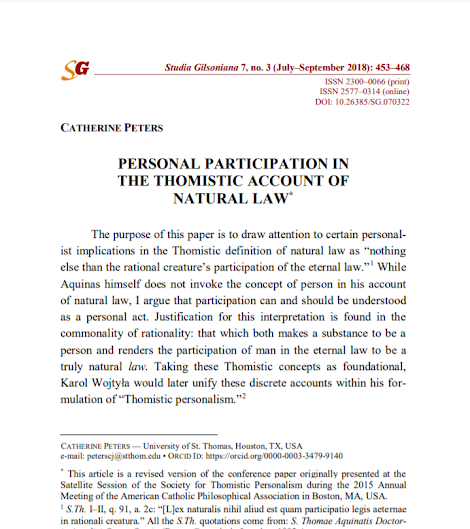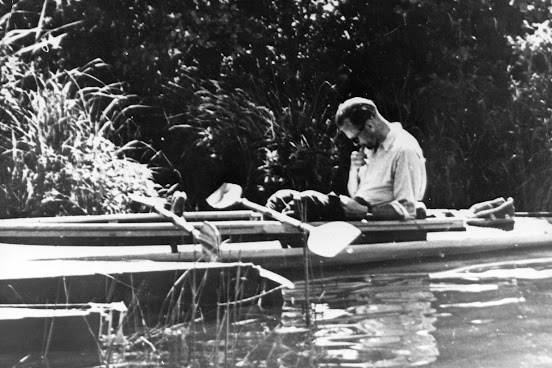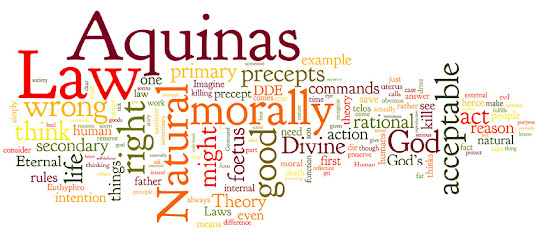Finding Happiness in the Natural Law? - "Personal Participation in the Thomistic Account of Natural Law" - Catherine Peters
Personal Participation in the Thomistic Account of Natural Law
This is a paper presented at a gathering of the American Catholic Philosophical Association in 2015 regarding topics of "Thomistic Personalism." In this paper, Catherine Peters seeks to lay out some of the necessary understanding of both Thomas Aquinas and Karol Wojtyla needed to adequately asses this new synthesis of Thomism and Personalistic philosophy. Specifically she is seeking an answer to the claim that Wojtyla makes that for the human being to seek to freely participate in the Natural Law is to experience objective human flourishing in their subjectivity. In general, she also makes the claim that Personalist philosophy, which emphasizes the experience of human subjectivity, can be authentic when it is grounded or nested within a metaphysical framework, especially that provided by St. Thomas Aquinas. Without such a framework, there is the temptation to fall into a radical subjectivity or relativity, one which clearly plagues contemporary society.
Introduction
Peters begins this article by stating that she is following in the vain of Thomistic Personalism developed by Karol Wojtyla and seeking to apply it to a part of St. Thomas Aquinas' philosophy regarding the Natural Law, more specifically the role of the individual person in living out the Natural Law. 1 She admits that some criticize this approach because it is a synthesis or movement in Thomism which St. Thomas never conceived of. The existential problems, and subjective experience of them, of the individual person is a concern of modern philosophy, while Thomas talks about personhood more on the level of objective definition. Also, Thomas' reflections on personhood were mainly a result of trying to understand the nature of God and the Trinity, but as Wojtyla argues and Peters agrees, doesn't mean that philosophical implications and applications can't be taken from his treatment. 2
Also as a preliminary remark, Peters points out that pursuing this question in the vain of Thomistic Personalism doesn't mean that one reduces the person to consciousness or subjectivity. Rather, Wojtyla made sure to ground the notion of person first metaphysically as a foundation by which one can properly understand subjectivity and the existential person. Only in understanding, first, what a person is can one then understand what a person is to do, or how they are to act. 3 To not understand the connection between the human as a nature, existing metaphysically in the world, and a person, living out their life through their subjectivity, is to fall into the trap of having false barriers arise in the realm of morality. Rather, by understanding the connection of these two ideas, it is possible then to see the connection between the individual person and their sharing the universal Natural Law. 4
What Does it Mean to "Participate" in the Natural Law?
Beginning by taking a look at the traditional Boethian definition of "person" that St. Thomas uses, which is "an individual substance of a rational nature," Peters points out that Thomas' view of the person is not one in which consciousness and body are divided entities. Or in which the soul and body are distinct from one another. Rather, the Hylomorphic view is that the soul is that which gives the material of the body its actuality. This actuality is highest in the soul's expression of rationality through the body. 5 Wojtyla is then going to extend Thomas' account by bringing his Personalist philosophy to bear. If the Natural Law is traditionally defined by St. Thomas as "man's participation in the Eternal Law of God," then it is our nature as human beings to be a part of this law. This also means that our subjectivity and our desires must also in some way be ordained to this same law. This is where Thomas' ideas can be furthered, in just such an exploration. 6 "The participation of natural law is realized through natural inclinations that are concomitant with man's rational nature." 7
 |
| See Footnotes for a link to the paper. |
While, in a way, all things participate by their existence, and by God's guiding providence towards the proper end of everything, in the Eternal Law of God, humans uniquely participation on the level of rationality. As such, we can say that participate in God's designs through a rational understanding of the ways in which he desires things to function, i.e. his laws. 8 Therefore, to participate in this law is the fulfillment of a human's nature, not some external imposition which harms his nature. 9 The emphasis on rational participation is important because rational implies a free participation. This is in distinction from a type of participation in nature that is determined by unconscious laws. Understood in this way, contradictions about personal consciousness and the direction of one's nature, or nature itself, goes away. The two fundamentally support one another, not contradict. 10
While St. Thomas, in defining the person, takes into account that people are individuals with subjectivity, doesn't necessarily seek to explore the content of that individual subjectivity. Therefore, Wojtyla, grounding that self-conscious subjectivity in the metaphysical nature of the person, can then begin to adequately explore it without falling into the pitfalls that many modern philosophies do, for example, that people are equal to their consciousness instead of having consciousness as a quality of one's inherent rationality. [One way that we could possibly see this play out is in gender ideology today. When we separate consciousness from our bodily existence then we can think that our conscious feelings are our true identity, while our biological reality is not and doesn't match. For Wojtyla, the body is the revelation of the deeper existence of the soul. The two are united thoroughly.] 11
Returning to the question at hand, we can then seek to examine what it means for an individual to willingly, consciously, and freely choose to participate in the Natural Law. 12 Most especially this highlights the encounter that man has with the law itself. The Natural Law, lived out, will also be then a bridge by which one encounters its origin, the Eternal Law. The Eternal Law is ultimately God, Himself. Therefore, the end of morality, the end of personhood, is an encounter with the divine. 13 After all, if our nature is personal, then God must be the ultimate person. 14
In Summary
Concluding the article, Peters ties things together. She says that the modern problems with the idea of Natural Law, and the idea of human flourishing through it, stem from a misconception that one's consciousness and body are two distinct realities. Within Thomistic Personalism it can be shown that our consciousness is a result of our rationality, a rationality which is metaphysically grounded in our formal soul, and which informs all of our being, including the body. Therefore, the perfection attained by virtue of the Natural Law is not only the "moral" thing to do, but also the path to authentic happiness experienced as a person, and ultimately to an encounter with the Divine Person who created nature and such laws. 15
 |
| A young Karol Wojtyla (Pope John Paul II) |
"By recognizing participation as essentially personal, Thomism is able to speak to the modern concern with subjectivity while not losing the objectivity of the natural law. The supposed conflict between natural law and person arises from a mistaken view of the person, reducing nature to the material subject of activity and identifying the person with consciousness alone. Wojtyla's personalist response recognizes the person as a rational subsistence and nature as the cause and source of human actualization. The solution to the supposed conflict between nature and law depends on a clear understanding of the nature of man. Only then can one understand the natural law as a free and personal participation." 16
--------------------
1 - Catherine Peters, “Personal Participation in the Thomistic Account of Natural Law,” Studia Gilsoniana 7, no. 3 (July–September 2018): 453–468: http://www.gilsonsociety.com/files/453-468-Peters.pdf Pg. 453
2 - 454
3 - 455
4 - 456
5 - 457
6 - 458
7 - 458, 459
8 - 459
9 - 460
10 - 461
11 - 462
12 - 463
13 - 464
14 - 465\
15 - 466
16 - 466




Comments
Post a Comment